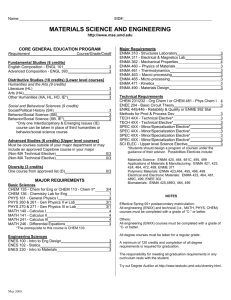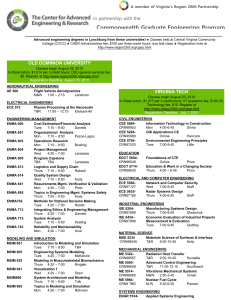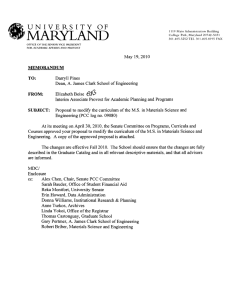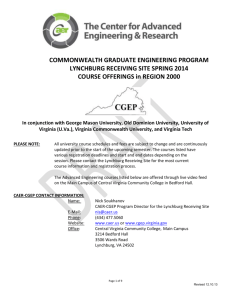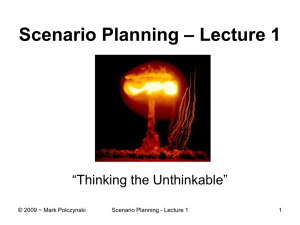MARYLAND U N I V E R S I T Y...
advertisement
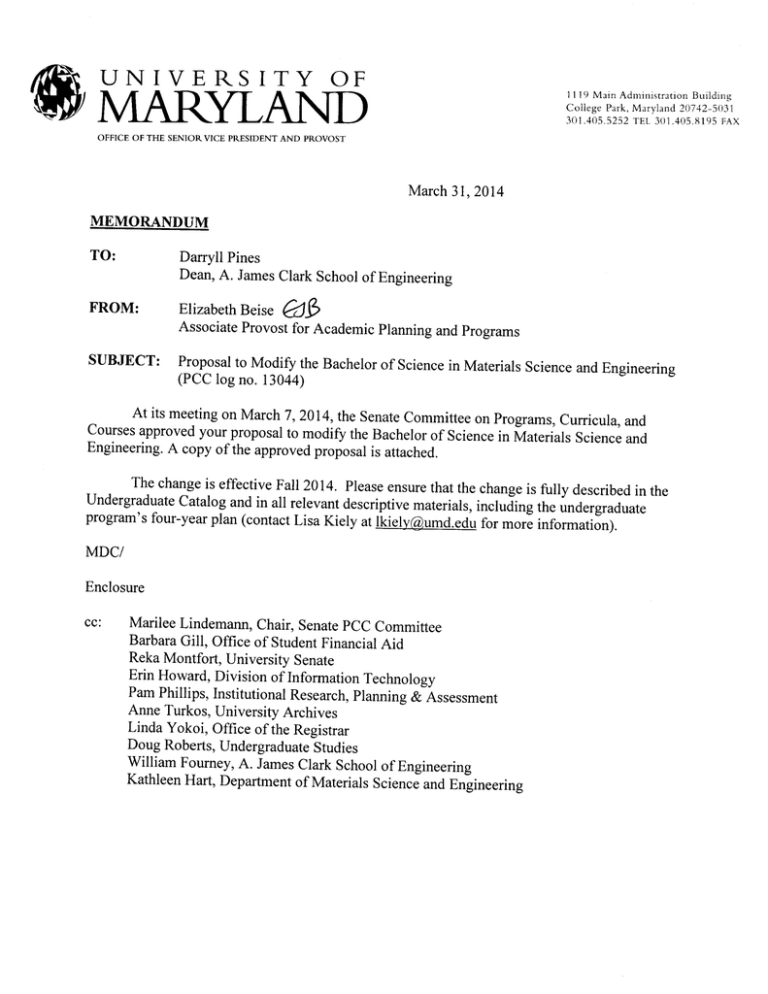
UNIVERSITY OF 1119 M a i n A d m i n i s t r a t i o n B u i l d i n g College Park, M a r y l a n d 20742-5031 301.405.5252 T E L 301.405.H195 FAX MARYLAND OFFICE OF T H E SENIOR VICE PRESIDENT AND PROVOST March 31, 2014 MEMORANDUM TO: Darryll Pines Dean, A. James Clark School of Engineering FROM: Elizabeth Beise Associate Provost for Academic Planning and Programs SUBJECT: Proposal to Modify the Bachelor of Science in Materials Science and Engineering (PCC log no. 13044) At its meeting on March 7, 2014, the Senate Committee on Programs, Curricula, and Courses approved your proposal to modify the Bachelor of Science in Materials Science and Engineering. A copy of the approved proposal is attached. The change is effective Fall 2014. Please ensure that the change is fully described in the Undergraduate Catalog and in all relevant descriptive materials, including the undergraduate program's four-year plan (contact Lisa Kiely at lkiely@umd.edu for more information). MDC/ Enclosure cc: Marilee Lindemann, Chair, Senate PCC Committee Barbara Gill, Office of Student Financial Aid Reka Montfort, University Senate Erin Howard, Division of Information Technology Pam Phillips, Institutional Research, Planning & Assessment Anne Turkos, University Archives Linda Yokoi, Office of the Registrar Doug Roberts, Undergraduate Studies William Fourney, A. James Clark School of Engineering Kathleen Hart, Department of Materials Science and Engineering T H E U N I V E R S I T Y O F MARYLAND, C O L L E G E PARK PROGRAM/CURRICULUM/UNIT PROPOSAL PCC LOG NO. • Please email the rest of the proposal as an MSWord attachment to pcc-submissions@.umd.cdu. Please submit the signed form to the Office of the Associate Provost for Academic Planning and Programs, 1119 Main Administration Building, Campus. College/School: Please also add College/School Unit Code-First 8 digits: 01203200 Unit Codes can be found at: https://hvpprod. umd. edu/Html Reports/units, htm Department/Program: Please also add Department/Program Unit Code-Last 7 digits: 1321901 Type of Action (choose one): • Curriculum change (including informal specializations) • New academic degree/award program X Curriculum change for an LEP Program • New Professional Studies award iteration • Renaming ofprogram or formal Area of Concentration • New Minor • Addition/deletion offormal Area of Concentration • Request to create an online version of an • Suspend/delete program program Italics indicate that the proposed program action must be presented to the full University Senate for conside Summary of Proposed Action: The Department of Materials Science and Engineering is proposing a change in the curriculum beginning in the Fall 2014 semester. The curriculum change will add courses that will provide students with important background to insure their preparation for the rapid changes occurring in the field. Additions to the curriculum include a new course in materials selection in design (ENMA 470) and a requirement of M A T H 206: Mat Lab (agreed to by the Mathematics Department). In addition, the Department proposes modifications to two existing courses (ENMA 441 and ENMA 362) and the addition of a new course (ENMA 312) to better couple lab experiences to specific courses throughout the curriculum which will increase learning outcomes for students. ENMA 426 (Reliability of Materials) and ENMA 463 (Macroprocessing) will no longer be required courses, but will become specialization electives. Students will now select five specialization courses rather than four. This will allow students to develop specialized knowledge in an area. Finally, students will be required to take ENMA 180 which is a one credit course to provide an orientation to the department typically during the freshman year. The proposed change in the curriculum will add one credit to the overall degree. For most of the students, there will be no issues transitioning to the new curriculum. The courses which are taken by seniors will be olTered in the Fall 2014 and Spring 2015 semesters. Seniors are expected to be able to graduate under the current curriculum. Rising juniors will for the most part transition to the new junior course ENMA 312. Since ENMA 310 and ENMA 311 will no longer be offered beginning with the Fall 2014 and Spring 2015, the Department will work with the few students who may be effected by the change to ENMA 312 due to study abroad or other issues which preclude them from taking either 310 or 311 at the appropriate time in their curriculum. The Department expects only a very small number of students to be effected by the change. Juniors, sophomores and freshmen will transition fairly seamlessly to the new curriculum. Departmental/Unit Contact Person for Proposal: Prof Isabel Lloyd. Undergraduate Program Chair APPROVAL SIGNATURES - Please print name, sign, and date. Use additional lines for mult 1. Department Committee Chair^^tf^ LA_^ 2. Department Chair /cXt^'i^^^ 7 M . 5. Dean of the Graduate School (if required)^ 6. Chair, Senate PCC [/K . ^ — 7. University Senate Chair (if required) 8. Senior Vice President and Provost CHEM 135, Chemistry for Engineers 3 ENES 100, Eng Design or ENES 102, Mechanics 1 3 ENES 102, Mechanics 1 or ENES 100 Eng. Design 3 MATH 141, Calculus II 4 3 3 MATH 140, Calculus 1 ENGL 101 4 3 PHYS 161, General Physics 1 GEN ED* CHEM 136, Chemistry Lab 1 GEN ED* 3 PHYS 260 and 261, General Physics II 4 PHYS 270 and 271, General Physics III 4 MATH 241, Calculus III 4 MATH 246, Differential Equations 3 ENMA 300, Intro to Materials Engineering 3 CHEM 231 and 232 or 481 \c Chemistry 1 or Physical Chemistry 1 4 or 3 Oral Communication 3 ENMA 301, Materials for Emerging Technologies 3 ENMA 310, Materials Lab: Structural Characterization 3 ENMA 311, Materials Lab II: Electrical and Magnetic 3 Property Experiments ENMA 362, Mechanical Properties ENMA 465, Microprocessing of Materials 3 ENMA 460, Physics of Materials 3 ENMA 461, Thermodynamics of Materials 3 GEN ED* 3 Scholarship in Practice* 3 Specialization Elective 3 Specialization Elective 3 ENMA 463, Macroprocessing of Materials 3 Technical Elective (> 300 level) 3 ENMA 471, Kinetics, Diffusion, Phase Transfomnations 3 Specialization Elective 3 Specialization Elective 3 ENMA 426, Reliability of Materials 3 ENGL 393 3 GEN ED* 3 Upper Leve| Science Elective 3 ENMA 490, Materials Design 3 Technical Elective (> 300 level) 3 * l t e m s in red r e p r e s e n t proposed changes t o t h e c u r r i c u l u m . CHEM 135, Chemistry for Engineers 3 ENES 100, Engineering Design ENES 102, Statics 3 MATH 141, Calculus II 4 MATH 140, Calculus 1 4 PHYS 161, General Physics 1 3 ENGL 101 3 GenED 3 CHEM 1 3 6 \y Lab 1 GenED 3 PHYS 260/261, General Physics II 4 PHYS 270/271, General Physics III 4 MATH 241, Calculus III 4 MATH 246, Differential Equations 3 ENMA 300, Intro to Materials Engineering 3 CHEM 231/232 or 481", Organic Chemistry 1 or Physical Chemistry 1 Oral Communication 3 ENMA 301, Materials for Emerging Technology 4 or 3 3 MATH 206 1 GenED 3 ENMA 312 OR Upper Level Science Elective ENMA 362, Mechanical Properties 3 ENMA 312 OR Upper Level Science Elective ENMA 465, Microprocessing of Materials 3 3 ENMA 460, Physics of Materials Scholarship in Practice* 3 ENMA 461, Thermodynamics of Materials Specialization Elective 3 3 Specialization Elective 3 ENMA 470, Materials Selection for Engineering Design 3 ENMA 441, Characterization of Materials 3 Technical Elective (> 300 level) ENMA 180: Intro to MSE 3 3 ENMA 471, Kinetics, Diffusion, Phase Transformations Specialization Elective 3 Specialization Elective 3 Specialization Elective 3 ENGL 393 3 GenED* 3 Technical Elective (> 300 level) 3 ENMA 490, Materials Design 3 The Department of Materials Science and Engineering is proposing a change in the curriculum beginning in the Fall 2014 semester. The curriculum change will add courses that will provide students with important background to insure their preparation for the rapid changes occurring in the field. Additions to the curriculum include a new course in materials selection in design (ENMA 470) and a requirement of MATH 206: Mat Lab (agreed to by the Mathematics Department). In addition, the Department proposes modifications to two existing courses (ENMA 441 and ENMA 362) and the addition of a new course (ENMA 312) to better couple lab experiences to specific courses throughout the curriculum which will increase learning outcomes for students. ENMA 426 (Reliability of Materials) and ENMA 463 (Macroprocessing) will no longer be required courses, but will become specialization electives. Students will now select five specialization courses rather than four. This will allow students to develop specialized knowledge in an area. Finally, students will be required to take ENMA 180 which is a one credit course to provide an orientation to the department typically during the freshman year. The proposed change in the curriculum will add one credit to the overall degree. Course ENMA312 ENMA 362 Pre-requisite or Co-requsite Pre-requisite or co requisite Course Offerings Schedule course offering ENMA 300 and ENMA 460 300 -Fall and Spring Fall and Spring semesters semesters 460- Fall semester ENMA 300 300 -Fall and Spring Fall Semester semesters ENMA 441 ENMA 300 300 -Fall and Spring semesters Fall semester ENMA470 ENMA 300 300-Fall and Spring semesters Spring Semester MATH 206 MATH 141 Fall, Spring, Summer semesters Fall, Spring, Summer semesters ENMA 180 none N/A Fall Semester Designation ENMA 312:Experimental Methods in Materials Science 3 X ENMA 470: Materials Selection for Engineering Design ENMAISO: Materials Science and Engineering: The Field and the Future ENMA 362: Mechanical Properties ENMA 441: Characterization of Materials MATH 206: Introduction to MatLab 3 X 1 M 3 M 3 M 1* Existing course Additional Specialization elective 3* Existing courses *These courses are currently offered and therefore do not need VPAC submissions. VPAC submission information ENMA 312: Experimental Methods in Materials Science - submitted to Kuali February 18, 2014 ENMA 470: Materials Selection for Engineering Design - submitted to Kuali February 12, 2014 - approved by College PCC February 18, 2014 ENMA 180: Materials Science and Engineering: The Field and the Future - submitted to Kuali November 25, 2013, approved by VPAC January 14, 2014. ENMA 362: Mechanical Properties - submitted to Kuali February February 18, 2014. ENMA 441: Characterization of Materials - submitted to Kuali February 18, 2014. MATH 206 and an additional specialization elective are current courses and as such do not require VPAC modifications or approvals. ENMA ENMA ENMA ENMA 310: 311: 426: 463: Materials Laboratory I: Structural Characterization Materials Laboratory II: Electromechanical Properties Reliability of Materials Macroprocessing of Materials UG Committee: We have approval to add MATH206 to our curriculum if we choose to do this. As a reminder, MATH206 is a 1-credit on-line course on MatLab. Rob Begin forwarded message: "Scott A. Wolpert" <swolpert@umd.edu> October 21, 2013 9:29:34 AM "Robert M. Briber" <rbriber@umd.edu>, "William L. Fourney" <four@umd.edu> Dear Chair Robert Briber and Associate Dean William Fourney, I am writing to confirm that Math supports the proposal of Materials Science to add the Matlab course Math 206 as a requirement for the undergraduate major. We view the course as contributing to the education of your students. We are doing this with the understanding that there will be approximately 35 students/year being added. Of course if the enrollment becomes significantly higher then we would like to discuss resources at that time. Sincerely, Scott Wolpert Robert M. Briber, Professor and Chair Dept. of Materials Science and Eng. http://www.mse.umd.edu Room 2135, Chem. & Nucl. Eng. BIdg (090) Univ. of Maryland, College Park, MD 20742 (301) 405-7313 (voice) / (301) 314-2029 (fax) rbriber@umd.edu http://www.mse.umd.edu/facultv/briber For most of the students, there will be no issues transitioning to the new curriculum. The courses which are taken by seniors will be offered in the Fall 2014 and Spring 2015 semesters. Seniors are expected to be able to graduate under the current curriculum. Rising juniors will for the most part transition to the new junior course ENMA 312. Since ENMA 310 and ENMA 311 will no longer be offered beginning with the Fall 2014 and Spring 2015, the Department will work with the few students who may be effected by the change to ENMA 312 due to study abroad or other issues which preclude them from taking either 310 or 311 at the appropriate time in their curriculum. The Department expects only a very small number of students to be effected by the change. Juniors, sophomores and freshmen will transition fairly seamlessly to the new curriculum. The proposed change in the curriculum will make it much easier for students from community colleges to transfer into the program. Currently if student lack the prerequisites (ENMA 300) for the junior year long lab sequence (ENMA 310 and 311), they must wait an entire year before they may begin the program. Under the proposed revision, transfer students who have not taken ENMA 300 (prerequisite) may take it in the fall semester and then take ENMA 312 in the spring semester. They will therefore be on track to complete their degree program in a timely manner. Curriculum Management: ENMAISO Materials Science and En... file:///C:AJsers/hart/Desktop/New curriculum/Testudo Curriculum Man. Hi, hart | Logout Select an area... r\-ll (M A N A C E M E N T Home » Curriculum Management » ENMA180 Materials Science and Engineering: The Field and the Future (Proposal) » Review Proposal Proposal Status: Approved | Comments (0) | Decisions Last Updated: 2014-01-1' Review Proposal Proposal Actions ENMA180 Materials Science and Engineering: The Field and the Future Materials Science and Engineering: The Field and the Future MSE FIELD AND FUTURE ENMA 180 Overview of the profession and the components of the Materials Science and Engineering program. Students will become familiar with the departmental faculty, areas of specialization within MSE, professional society student chapter, research opportunities and other resources available to students. ' ' ' < This proposal is to add an option for a student receiving a grade for the class. ENGR-Materials Science & Engineering Yes -propi>H| Regular (Letter) : Satisfactory/Fail 2/19/2014 12:52 PM Print - Testudo Curriculum Management: ENMA 312: Experimental... i JjHf<i<::lJIJ;M https://umd-cm.umd.edu/org.kuali.student.lum.lu.ui.main.LUMM '-Mi---- Home » Curriculum Management » ENMA 312: Experimental Methods in Materials Science (Proposal) » Review Proposal ENMA Experimental Methods in Materials Science (Proposal) R e v i e w Proposal ENMA 312: Experimental Mettiods in Materials Science ENMA 312: Experimental Methods in Materials Science EXPERIMENTAL METHODS ENMA 312 Introduction to experimental methods in materials characterization: synthesis of colloidal nanoparticles; X-ray diffraction and light scattering: optical microscopy; thermal conductivity and expansion; electrical measurements; heat capacity; computational materials design. j h e Department has recently had a curriculum review to assess the teaching of experimental and characterization methods across the curriculum. ENMA 312 is proposed as new course to provide instruction in a variety of experimental methods during the junior year. ENGR-Materials Science & Engineering yes - PCC proposal submitted Regular (Letter) Yes Yes 3.0 Standard Semester (15 weel<s) 1.5 3 67.5 ' 1 of 2 3 2/21/2014 1:43 PM Print - Testudo Curriculum Management; ENMA 312: Experimental... https://umd-cm.umd.edu/org.kuali.student.lum.lu.ui.main.LUMM Describe a variety of experimental methods and identify w/hen they should be applied Identify what materials' properties a particular method probes Identify the most appropriate method(s) to probe specific materials characteristics. Be able to design experiments, based on this knowledge Identify the limitations of a specific characterization method. Understand how different characterization methods complement each other Become familiar with modern methods of materials charactenzation, similar to those encountered in Industrial and testing facilities, and government laboratory. Communicate effectively their results and findings through reports and orally. Must meet • Must have completed ENMA300 Must meet Must be concurrently enrolled In ENMA460 Must meet all of f o l l o w i n g : • Must have Junior standing or higher 2014Fall No 2 of 2 2/21/2014 1:43 PM Print - Testudo Curriculum Management: Mechanical Properties (Pro... https://umd-cm.umd.edu/org.kuali.student.lum.lu.ui.main.LUMM H o m e » C u r h c u l u m M a n a g e m e n t » M e c h a n i c a l Properties ( P r o p o s a l ) » R e v i e w P r o p o s a l Mechanical Properties (Proposal) Review Proposal Mechanical Properties Mechanical Properties Mechanical Properties MECHANICAL PROPERTIES MECHANICAL PROPERTIES ENMA Overview of Mechanical Behavior, Elastic Behavior. Dislocations, Plastic Fundamentals of mechanical behavior in materials. Elastic behavior Deformation, Strengthening of Crystalline Materials, Composite Materials, dislocations, strengthening, high temperature deformation, deformation of noncrystalline matenals, tensile fracture and fatigue High Temperature Deformation of Crystalline Materials. Permanent Deformation of Noncrystalline Matenals, Tensile Fracture at Low Temperatures, Engineenng Aspects of Fracture, High Temperature Fracture, Fatigue, and Experimental determination of Mechanical Properties including Hardness of Metals and Strength of Metals. Polymers, Ceramics and Composites. The Department of Matenals Science and Engineering recently reviewed the expenmental and characterization courses in the curriculum ENMA 362 has been modified slightly in content and will be reduced to 3 credits with some lab time removed from the schedule ENGR-Materials Science & Engineering ENGR-Materials Science & Engineering Yes - PCC proposal submitted No (Letter) Yes Standard Semester (15 weeks) Standard Semester (15 weeks) ' Understand how the chemical composition and microstructure effect mechanical properties of various engineering materials ' Understand the ways to alter the microstructure • Learn how vanous factors such as temperature and strain rate effect mechanical properties Learn how to expenmentally determine the mechanical properties Analyze and interpret the test data Must meet of following: • 1 of 2 Must have completed ENMA300 Must meet • Must have completed ENMA300 2/21/2014 1:46 PM Print - Testudo Curriculum Management: Mechanical Properties (Pro. https://umd-cm.umd.edu/org.kuaIi.student.Ium.lu.ui.main.LUMMain.. Must meet all of the following: Must meet of f o l l o w i n g : • Must have Junior standing or higher • Must have Junior standir>g or higher • AND Permission of ENGR-Matenals Science & Engineering department • OR Pennission of ENGR-Materials Science & Engineenng department 2002Fall 2 of 2 2/21/2014 1:46 PM Print - Testudo Curriculum Management: Characterization of Material..https:/7umd-cm.umd.edu/org.kuali.student.lum.lu.ui.main.LUMMain.. H o m e » Curriculum M a n a g e m e n t » C h a r a c t e n z a t i o n of M a t e n a l s (Proposal) » R e v i e w P r o p o s a l Characterization of Materials (Proposal) Review Proposal Charactenzation of Materials Charactenzation of Matenals Nanotechnology Characterization CHARACTERIZATION OF MAT NANOTECH CHARACTERIZTN 441 441 Techniques to characterize structure, composition and transport at the course covers techniques to charactenze the properties of matenals nanoscale are covered. Underlying principles, instrumentation, capabilities charactenstic dimensions range from nanometers to macroscopic These include conventional crystalline and noncrystalline materials, with aand limitations are discussed for scanning tunneling microscopy and special attention to matenals of current technological interest. The course will spectroscopy, force microscopies, electron optical microscopies and scattering techniques Examples from the recent literature are discussed through include recent results from the scientific literature. in-class presentations and guest lectures. The course will be broadened to cover additional characterization techniques beyond those at the nanoscale ENGR-Materials Science & Engineering ENGR-Matenals Science & Engineering Yes - PCC proposal submitted ENMA489T ENMA489T ENMA489T or ENMA441 ENMA489T or ENMA441 Regular (Letter) Regular (Letter) 3.0 Standard Semester (15 weeks) Standard Semester (15 weeks) ' Students learn elements of quantum mechanical confinement and tunneling, and how these are used in scanning tunneling microscopy and spectroscopy. Students learn about surface forces and potentials, and how these are used in scanning force microscopy and force curve interpretation Students learn about scattering phenomena and their application to characterizing nanostructured materials. Must meet all of the f o l l o w i n g : • 1 of2 Must have completed ENMA300 2/2I/20I4 1:37 PM Print - Testudo Curriculum Management: Ctiaracterization of Material..https://umd-cm.umd.edu/org.kuali.student.lum.lu.ui.main.LUMMain. Must meet meet 2 of 2 • Pemiission of ENGR-Materials Science & Engineering department • AND have Senior standing * Permission of ENGR-Materials Science Engineering department • AND 2/21/2014 1:37 PM Testudo Curriculum Management: ENMA 470: Materials Selection for E... file:///C:/Users/hart/Desktop/New curriculum/Testudo Curriculum Select an area.. IfM Home » Curriculum Management » ENMA 470: Materials Selection for Engineering Design (Proposal) » Review Proposal Last Updated: 2014-02-1! Proposal Status: Enroute | Comments (0) | Decisions Review Proposal Proposal Actions ENMA 470: Materials Selection for Engineering Design Materials Selection for Engineering Design MATERIALS SELECTION ENMA 470 Students will learn about materials classes, properties, limitations and applicatic methodology of materials selection in engineering design. This course has been taught as a special topics course. A permanent number is ENGR-Materials Science & Engineenng No ^ ^ ^ ^ 2 | r . | ENMA 4890 ENMA 470 or ENMA 489 0 Regular (Letter) Yes Yes 3,0 Standard Semester (15 weeks) 1 of 1 2/19/2014 12:46 PM Department of Materials Science and Engineering University of Maryland, College Park, Maryland ENMA 180: Materials Science and Engineering: The Field and the Future Course Description: Overview of the profession and the components of the Materials Science and Engineering program. Students will become familiar with the departmental faculty, areas of specialization within MSE, professional society student chapter, research opportunities and other resources available to students. Pre-requisites: none Course Objectives: The objective of this class is to provide students new to the major with information about the field of materials science and engineering and the administrative requirements of the major. They will be able to: 1. Identify the specialization areas in the MSE major 2. Identify Department and University resources available to MSE students. Class Schedule: Monday, 4 - 4:50 Week 1 Date 9/8/14 Topic(s) Assignments Due Introduction Course Expectations/Syllabus Review September 16 at 4:30pm – Schedule Adjustment Ends 2 9/15/14 Resources in the Department and in the College and University 3 9/22/14 MatES and Materials Advantage 4 9/29/14 How to Prepare for Midterms Specialization area: Materials Science 5 6 10/6/14 10/13/14 7 10/20/14 8 10/27/14 Engineering Career Center Time Management Project Degree Navigator Assignment Specialization area: Nanotechnology and the Nanoscale Technology minor Departmental Advising and Mentoring Process Specialization area: Soft Materials and Biomaterials Mid-Semester Check-In 9 11/3/14 Specialization area: Electrical, Optical and Functional Materials 10 11/10/11 Specialization area: Materials for Energy 11 11/17/14 Research or internships/ /National Scholarships Office 12 11/24/14 13 12/1/14 14 12/8/1 Four Year plan Mentoring Form submission Ethics in the Engineering Profession Mentoring program with upperclassmen Wrap up Session Semester Wrap Up Grading: ENMA 180 will be offered on a regular grade and a satisfactory/fail basis. There will be several short assignments throughout the semester which will have points assigned. The total number of points you receive will determine your grade for the course and if you pass or fail the course. Grading Policy Class Participation (14 classes) Time Management Project Degree Navigator Exploration Mid Semester Check in 4-Year Plans Mentoring with MSE faculty Semester Wrap Up 70 points (5 points each) 25 points 25 points 25 points 25 points 25 points 25 points Total Grading Scale 220 points 90-100% 80-89% 70-79% 60-69% Below 60% A B C D F Students who select the S/F option must achieve a score of 60% or above to receive a satisfactory grade in the course. Assignments (upload to Canvas course site by 11:59 PM on due date) 1. Time Management Project (25 Points) This assignment will be available for download on Canvas. There are four parts to this assignment: 1) Identify how much free time you have based on your academic/work/personal commitments 2) Answer a few questions about your studying and learning patterns 3) Fill in a week long calendar with all of your class times intended study times, extracurricular activities, practices and other activities 4) Plan on a calendar (of your choosing) all of your exams, papers, and assignments, for all Fall 2013 classes, on the day they are due. Note: you must be able to print/photocopy this calendar in order to submit this portion of the assignment. 2. Degree Navigator - 25 Points: Visit MyUM: www.my.umd.edu. Click on the Academics & Testudo Tab. At the bottom of the page, click on the Degree Navigator (audit) link. Click on Welcome to Degree Navigator at the bottom of the next page/window. Log-on with your directory ID and password. Your major is listed on the right hand side of the page in white hyperlinks under your name. Answer the following questions. 1. What is your major? 2. What are the basic science courses you are required to take for your major? 3. What courses do you have to have completed to successfully pass the 45 credit benchmark in your field? 4. What is the GPA requirement of all courses in your major? 5. How many diversity courses are you required to enroll in for your degree? Are there different types of diversity courses and if so please identify them. 3. Mid Semester Update - 25 points Write a one page report which explains how the first 7 weeks of college have been for you. Be sure to include information about how your classes are going, how your interaction with faculty and TAs has been, a new activity you have tried, interactions with roommates and/or individuals on your floor, how balancing your activities and demands is going, etc. 4. Four Year Plan - 25 Points Download the four year plan for your major from the A. James Clark School of Engineering website. Complete the form utilizing degree navigator, the information you have received in the course and the website for your program. 5. Mentoring with MSE Faculty Member – 25 Points: Schedule a mentoring meeting with one of the Materials Science and Engineering faculty members. Write brief summary (500 words) about the meeting and be sure to include: (1) how you prepared for the meeting, (2) who you met with, (3) what you discussed, and (4) what you gained from the meeting. 6. The Semester Wrap up – 25 Points The first semester of your college career is about over! Write one page which summaries how the first semester went for you. What have you learned this semester? What would you do differently if you could start over? What would you keep the same? If you had a chance to share your experiences with seniors at your high school, what would you tell them about college? Academic Integrity: http://www.shc.umd.edu/ Attendance Policy: Regular attendance and participation in this class is the best way to grasp the concepts and principles being discussed. However, in the event that a class must be missed due to an illness, the policy in this class is as follows: 1. For every medically necessary absence from class, a reasonable effort should be made to notify the instructor in advance of the class. When returning to class, students must bring a note identifying the date of and reason for the absence, and acknowledging that the information in the note is accurate. 2. If a student is absent for more than three classes, the instructor may require documentation signed by a health care professional. 3. If a student is absent on days when tests or presentations are scheduled, he or she is required to notify the instructor in advance, and upon returning to class, bring documentation of the illness, signed by a health care professional. Academic Accommodations: If you have a documented disability, you should contact Disability Support Services 0126 Shoemaker Hall. Each semester students with documented disabilities should apply to DSS for accommodation request forms which you can provide to your professors as proof of your eligibility for accommodations. The rules for eligibility and the types of accommodations a student may request can be reviewed on the DSS web site at http://www.counseling.umd.edu/DSS/receiving_serv.html. Religious Observances: The University System of Maryland policy provides that students should not be penalized because of observances of their religious beliefs. Students shall be given an opportunity, whenever feasible, to make up within a reasonable time any academic assignment that is missed due to individual participation in religious observances. It is the responsibility of the student to inform the instructor of any intended absences for religious observances in advance. Notice should be provided as soon as possible but no later than the end of the schedule adjustment period. Faculty should further remind students that prior notification is especially important in connection with final exams, since failure to reschedule a final exam before the conclusion of the final examination period may result in loss of credits during the semester. The problem is especially likely to arise when final exams are scheduled on Saturdays. CourseEvalUM Fall 2014: Your participation in the evaluation of courses through CourseEvalUM is a responsibility you hold as a student member of our academic community. Your feedback is confidential and important to the improvement of teaching and learning at the University as well as to the tenure and promotion process. CourseEvalUM will be open for you to complete your evaluations for semester courses sometime in December 2014. Please go directly to the website (www.courseevalum.umd.edu) to complete your evaluations. By completing all of your evaluations each semester, you will have the privilege of accessing online, at Testudo, the evaluation reports for the thousands of courses for which 70% or more students submitted their evaluations. Relationship of the class to the program objectives: This course is an elective course. Students will receive basic information about the field of materials science and engineering and the administrative requirements that they must meet. Instructor: Kathleen Hart 1113 Chemical/Nuclear Engineering Building Email:hart@umd.edu 301-405-5989 (telephone) Office hours: Monday, Wednesday – 2-3:00 Tuesday, Thursday – 9-10 JustificationforthecreditincreaseintheundergraduateMSE(MaterialsScienceand EngineeringProgram TheincreaseintherequiredcourseworkintheMSE(ENMA)Programisbasedon studentexitinterviewsandouron‐goingcurriculumreviewforABETaccreditation. Basedonboth,wedeterminedthattwo1‐creditclassesshouldbeadded,ENMA180, thenewFreshmanSeminar,andMATH206,IntroductiontoMATLAB.Wewantedto addtheFreshmanSeminartogetthestudentsengagedinthemajorimmediatelyin termsofunderstandinghowtheUniversityandthemajorworks(ourmentoring program,specializationelectivesandtechnicalelectives,advising,etc.)andthinking aboutfuturecareerpaths.Ourdecisiontoincludethis1‐creditseminarclassis basedonsuccessfulimplementationofthesametypeofcoursebyanumberofother Engineeringprograms(Aero,Civil,Mechanical,FireProtection).MATH206was addedbecauseourstudentshavebeenrequestingmorecomputermodelinginthe curriculumanditisagoodpathwaytopreparethemforcomputermodelingand simulationsinclassesinthemajor.WewereabletocutonecreditfromtheENMA 362,themechanicalpropertiesclassbutwecouldn'treasonablycutany3‐credit classesto2creditssoweaddedonecredit. IsabelK.LloydFeb.27,2014
